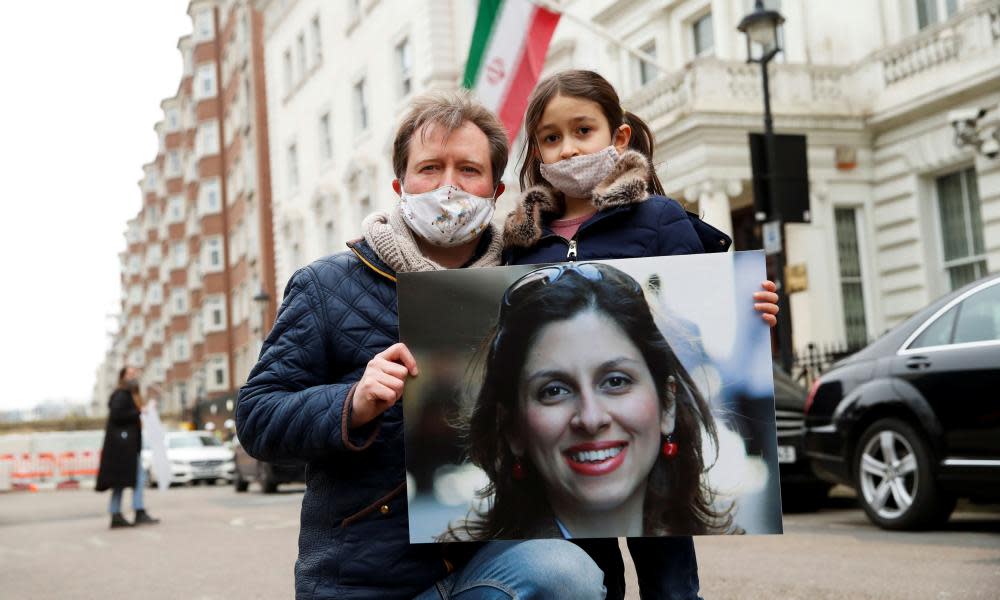Nazanin Zaghari-Ratcliffe saga nearing its end, says former Foreign Office chief

Long-running efforts to get Nazanin Zaghari-Ratcliffe back to the UK are nearing their endgame, the recently retired head of the Foreign Office has said.
Lord McDonald, permanent undersecretary at the FCDO until the summer, said for the first time that the UK had been looking at repaying a historical £400m debt to Iran through humanitarian payments that would not be subject to sanctions against the country.
It has been widely claimed that Zaghari-Ratcliffe and other British-Iranian dual nationals who have been jailed in Iran are being held hostage until the UK repays the debt arising from arms sales to the shah of Iran in the mid-1970s.
McDonald told the BBC Radio 4 Today programme: “We acknowledge it is Iranian money and it does have to go back to Iran. A key complication is that Iran is subject to very comprehensive sanctions, so how this money is repaid is part of the story.”
Asked whether the UK had looked into a humanitarian route for paying back the debt he said “huge imagination and effort has gone into this”.
He did not say why this effort had not yet borne fruit, but pointed out that another hearing in the dispute over the payment of the debt was due in April.
There are some preliminary signs that the US may be willing to relax the sanctions on Iran gaining access to its own funds in foreign bank accounts for use in humanitarian purposes. This principle could be extended by the US offering a sanctions waiver on the payment of the UK debt through a humanitarian route, but the US is also trying to put pressure on Iran to start talks on the future of the nuclear deal.
McDonald continued with the FCDO line that the payment of the debt and the release of British-Iranian dual nationals were unrelated. He acknowledged that the UK could not afford to be seen to be succumbing to what amounts to state hostage-taking. “We will not allow linkage to be made in this case,” he said, adding a precedent could not be set.
He said the Zaghari-Ratcliffe saga was reaching its endgame, but that power was divided in Iran between different centres, with the Revolutionary Guards “particularly active and controlling in Nazanin’s case”.
He was speaking the day after the Iranian authorities removed the ankle tag from Zaghari-Ratcliffe after the completion of her five-year sentence, but said she would face a second set of charges on Sunday 14 March.
Her husband, Richard Ratcliffe, said he did not know what those charges were but they appeared to be related to a case first raised by the Iranians in November 2017 that he said “at times has been blamed on Boris Johnson and at times less so”.
Johnson told a select committee that Zaghari-Ratcliffe had been in Tehran to train journalists. He later told the Commons, on 7 November 2017: “My point was that I disagreed with the Iranian view that training journalists was a crime, not that I wanted to lend any credence to Iranian allegations that Mrs Zaghari-Ratcliffe had been engaged in such activity. I accept that my remarks could have been clearer in that respect and I’m glad to provide this clarification.”
If the charges amount to spreading propaganda against the regime, it would be tempting for the Iranians, as a way of putting pressure on the UK government, to cite Boris Johnson in evidence.
Ratcliffe joined a protest calling for his wife’s immediate release outside the Iranian embassy in central London on Monday. He was accompanied by the couple’s six-year-old daughter, Gabriella, and others in front of the building in Knightsbridge.
The small group of protesters held placards carrying the messages: “Free Nazanin,” and: “Still not forgotten.”
Ratcliffe put his arm around his daughter as they both held a placard featuring a photo of Zaghari-Ratcliffe.
Gabriella used a pen to cross off the final day in a calendar that counted the days until “Mummy comes back home” and read out messages of support for her mother.

 Yahoo Movies
Yahoo Movies 
